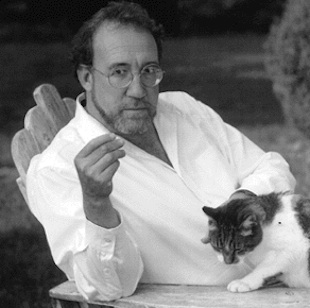 Monday night brought the sad news that writer Richard Ben Cramer had died from lung cancer at age 62. The celebrated author won a Pulitzer Prize for reporting from the Middle East and was best known for "What It Takes," his sprawling and detailed take on the assortment of candidates who took part in the 1988 presidential election.
Monday night brought the sad news that writer Richard Ben Cramer had died from lung cancer at age 62. The celebrated author won a Pulitzer Prize for reporting from the Middle East and was best known for "What It Takes," his sprawling and detailed take on the assortment of candidates who took part in the 1988 presidential election.
Both of those facts are leading Cramer's obituaries today and for good reason. "What It Takes" is often called the last great book to be written from a campaign trail while his reporting at the Baltimore Sun and the Philadelphia Inquirer was so in-depth that it later inspired a generation of reporters. Bronx Banter's Alex Belth has compiled a great sampling of Cramer's magazine work if you're interested in getting lost in some of his fine work.
But just as "What It Takes" opened with the scene of George H.W. Bush throwing out the first pitch at a Houston Astros game, baseball occupied a permanent subhed on Cramer's personal biography title. If you're a baseball fan who appreciates good writing, you've no doubt already read "Joe DiMaggio: The Hero's Life," Cramer's 2001 best-selling biography on the New York Yankees superstar. And you probably also know that his "What Do You Think of Ted Williams Now?" profile is considered one of the best in journalism history. Esquire even named his look at a post-retirement, fishing-obsessed Williams as one of the best seven stories to ever run in its pages.
Wrote Cramer of Teddy Ballgame:
He does not go to restaurants, and the reasons are several: They make a fuss, and the owner or cook's on his neck like gnat. Or worse, it's a stream of sportsfans (still Ted's worst epithet) with napkins to sign. At restaurants you wait, wait, wait. Restaurants have little chairs and tables, no place for elbows, arms, knees, feet. At restaurants there's never enough food. Lastly, restaurants charge a lot, and Ted doesn't toss money around. (A few years ago he decided $2.38 was top price for a pound of beef. For more than a year, he honed his technique on chuck roast and stew meat. Only an incipient boycott by his friends, frequent dinner guests, finally shook his resolve.)
There are many reasons why today's media generally pays heed to Stanley Woodward's old "stop godding up the ballplayers" directive, but Cramer's influence is surely among them. If he could take clear and complete looks at DiMaggio and Williams — two of the most revered talents to ever play the game — well, it shouldn't be that hard for the rest of us.
Here's the thing, though: Cramer's artful way of pulling back the curtain was never done in a malicious fashion or with an intent to yell "gotcha!" upon publication. No, Cramer was so thorough and confident in his writing that even a subject had to admit his portrait had been perfected.
At least if that subject was being honest with himself. ("So that's how people see me?" Joe Biden famously said to Cramer after reading about himself in "What It Takes.")
Cramer wasn't done with writing about generational baseball icons after the success of the DiMaggio biography. He had been working on an Alex Rodriguez biography for three years and had even reportedly been receiving help from A-Rod himself. The book was tentatively titled "The Importance of Being Alex: A Life With The Yankees" and was scheduled for a 2014 release before Cramer said it had been put on hiatus midway through 2012. It was then reported in December that Cramer was being sued his publisher for $550,000 after failing to deliver the A-Rod book as promised.
Writing a definitive and marketable biography on A-Rod before retirement is one of sports journalism's greatest challenges, even for someone who had tackled subjects like the state of Israel's political evolution. So much of A-Rod's life has been in the public spotlight and he's not exactly the type of warm and nostalgic figure that would have driven Father's Day book sales. Selena Roberts tried her hand at an A-Rod bio in 2009 and it never made many waves past the initial New York tabloid-driven stories about steroid use and A-Rod's complaints that Roberts had been "stalking" him.
Still, it's a shame we'll never get to see whether Cramer could have pulled it off on his turn with A-Rod. I always through the A-Rod book should have been subtitled "The Anti-Hero's Life" and it would have been fascinating to watch Cramer do the opposite of what he did with DiMaggio while ultimately arriving at the same destination. That is to say, take a ballplayer who has been largely unloved by the public and peel away all the layers of spotlight-driven bias before arriving at a complete take on a man who's as human as the rest of us.
While Cramer had to cut through the constant adulation that smothered DiMaggio to arrive at the Yankee Clipper's lonely and often-insecure existence, he was facing the prospect of an alternate route with A-Rod. Could Cramer, with the benefit of more time, have gotten past A-Rod's public insecurity and the blinding amounts of money he's been paid to tell us the story of how a boy from Miami ended up being one of the biggest lightning rods in this new 24/7/365 media world?
With Cramer's untimely death, we'll never get the pleasure of knowing. But we wouldn't have bet against a man who became a giant of journalism by always delivering the unexpected.
Stay warm this winter!
Follow @bigleaguestew, @KevinKaduk and the BLS Facebook page!
No comments:
Post a Comment